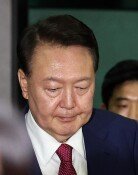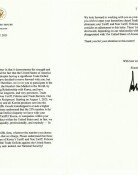Lee and Roh Denouncing Each Other for Copying the Others Election Pledges
Lee and Roh Denouncing Each Other for Copying the Others Election Pledges
Posted December. 09, 2002 22:49,
As major presidential candidates Lee Hoi-chang of the GNP and Roh Moo-hyun of the MDP are copying part of rival camps policy pledges in an attempt to win over voters, a trend of policy convergence leading to no clear distinction in policies presented by the two candidates is emerging.
While the GNP candidate promised a comprehensive reform of the nations intelligence agency through the revision of the NIS law right after the allegation of wiretappings of politicians by the National Intelligence Service, Ron Moo-hyun of the MDP, his archrival in the election, presented a similar election pledge by promising the public to transform the intelligence agency into a overseas intelligence agency and to prevent the agency from carrying out domestic intelligence gathering.
The same is true for the issue of the constitutional revision. After Roh reached an agreement with Chung Mong-jun of the start-up National Alliance 21 on the constitutional revision to change the current government system to a decentralized presidential system in the 17th National Assembly sessions in 2004, Lee promised to push ahead with the constitutional amendment even if it resulted in shortening his time in office in a press conference arranged at a short notice.
Furthermore, after the GNP promised to reduce the compulsory military service period by two months on Sept. 20, in response to the GNP move, the MDP candidate, who had been against it, went a step further on Dec. 8 by promoting the reduction by four months, taking military absentee ballets into account.
In the wake of the escalating public anger over the acquittal of two American soldiers involved in the deaths of the two Korean girls, Lee Hoi-chang, who has been considered a politician putting a great emphasis on the Korea-U.S. alliance, is taking a different path to make a fresh image when it comes to the U.S. ties by visiting a demonstration site staged by a Catholic priest organization on Dec. 7. The visit was followed by his participation in a public petition drive demanding the revision of the SOFA governing the legal status of the American soldiers here.
In contrast, Roh Moo-hyn, who has been emphasizing independent diplomatic relations with the U.S., is refraining from taking on his personal opinion on the issues by refusing to attend a public memorial service of the two girls killed by an armored American vehicle in protest and to sign the public petition.
The two major parties are criticizing each other for plagiarizing the others election pledges on Dec. 9.
Leem Tae-hee, chairman of the GNP policy coordination committee, insisted the MDP copied its policies. He was quoted as saying, The MDP initially had promised a 5% annual economic growth. However, it raised its growth forecast to 7% when the GNP presented 6% of economic growth. And also, after we promised to spend 3% of the GDP in the national defense, the MDP followed suit. He said the MDP should stop copping the GNPs election pledges.
Chang Jun-hyung, deputy spokesman of the MDP, refuted the GNPs contention by saying, Lees hasty and ill-prepared plan to reform politics unveiled on 8 was aimed to emulate the public image of the MDPs nominee as a pro-reform minded figure. Lee promised to transform Dae-jeon, a southeast province, into a city of science and technology in response to the MDP candidates promise to relocate the nations capital to the central province of Chungcheong.
Kwon Youngghil of the Democratic Labor Party (DLP) issued a statement on Dec.9. In the statement, he denounced the MDP candidate by saying that Rohs refusal of signing the petition demanding the revision of the SOFA can be interpreted as an effort to win over the minds of conservatives in Korea by adopting a sophisticated opportunistic tactic. Lee Han-dong of the Hanro National Coalition denounced Lee Hoi-chang is taking an opportunistic strategy to garner more votes in the upcoming election and is facing an identity crisis as a conservative politician.
Political analysts expressed concerns over the current policy convergence trend, pointing out that it is desirable to reach a public consensus on a certain issue, however, without a through examination of action plans, a sudden policy shift in a political camp to win over voters mind may result in excessive issues and public distrust in politics.
Jeong-Hun Kim jnghn@donga.com







